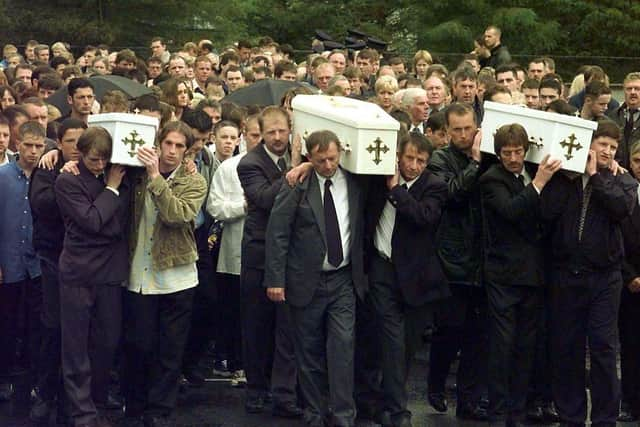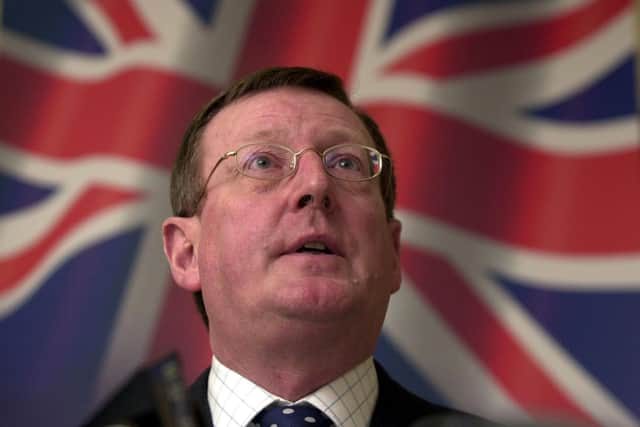Euan McColm: Prime ministerial candidates seem to have given little thought to peace in Northern Ireland
Now, I was standing in a muddy graveyard, watching a procession of men carry three small white coffins.
The sun had shone over Our Lady and St Patrick church in Ballymoney while the funeral service was taking place earlier on July 14,1998. But the rain started falling eight miles south in the village of Rasharkin as the bodies of brothers Jason, Mark and Richard Quinn - aged eight, nine, and 10, respectively - were lowered into the ground.
Advertisement
Hide AdAdvertisement
Hide AdThe sight of a small white coffin being put to its intended use is never forgotten, is it?


But more vivid still in my memory than that image is the sound the boys’ father made as he led mourners into the graveyard. It was long, low howl of anguish. I wish I could forget it.
The Quinn brothers were murdered by the Ulster Volunteer Force. Tensions in communities across Northern Ireland had been mounting for a week after members of the Orange Order were prevented by authorities from marching from Drumcree Church along the predominantly Catholic Garvaghy Road in Portadown. Something had to give and when it did, it was 45 miles away.
The Quinn boys died after their home was petrol-bombed. It was another shocking pointless murder in a catalogue of shocking pointless murders throughout the troubles.


Two months before the Quinn brothers died, more than two thirds of people in Northern Ireland voted in support of the Good Friday Agreement, the deal which was to bring peace to the country after almost three decades of sectarian terrorist attacks that had seen thousands murdered.
The brothers’ murder was an act of brutality by an organisation struggling to come to terms with a rapidly changing reality.
The death last week of David Trimble, former leader of the Ulster Unionist Party, was a reminder of the efforts it took to reach a deal that would lead to peace. Three years before the Good Friday Agreement was struck, Trimble was rallying members of the Orange Order in Portadown to protest a decision by police to prevent marchers from entering Garvaghy Road.
In 1995, David Trimble wasn’t doing much to help the situation in Northern Ireland. Yet, in just a few short years, he would have played a leading role in ending the country’s cycle of sectarian violence.
Advertisement
Hide AdAdvertisement
Hide AdTrimble would go on to become Northern Ireland’s first First Minister, working with a deputy - Seamus Mallon - who represented the nationalist SDLP.
And if that arrangement had been unthinkable just months previously, what was to come next showed just how far Northern Ireland had come in an incredibly short period of time.
That Trimble’s successor as First Minister, DUP leader Ian Paisley, the thunder-voiced champion of no-compromise Unionism, could work with a deputy in the shape of Sinn Fein’s Martin McGuinness was - and remains - quite remarkable to consider.
David Trimble’s death, announced shortly before a televised debate between the candidates to become leader of the Conservative Party and Prime Minister, Rishi Sunak and Liz Truss, was followed by tributes from across the political spectrum. The outpouring of respect seemed appropriate.
It is certainly true that Trimble was a flawed man. Much of his life was spent fomenting intolerance.
But all of those who came to the negotiating table to broker peace in Northern Ireland had their flaws. Martin McGuinness had been a commander in the Provisional IRA, which doesn't speak of a blameless life.
Trimble earned the right to be considered a giant of modern politics. I’m not sure the same status will ever be accorded to Sunak or Truss.
When it comes to the subject of peace in Northern Ireland, neither seems to be giving the matter much thought. Yet, one of the first tasks the winner will have to take on is finding a solution to ongoing Brexit-created problems across the Irish sea.
Advertisement
Hide AdAdvertisement
Hide AdThe government has signalled its willingness to tear up the Northern Ireland Protocol, an agreement with the EU that prevents the need for a hard border between the north and the Republic in the south.
That might satisfy unionist politicians, currently unhappy that the protocol creates what they see as a border in the Irish Sea but it would do nothing to please nationalists.
Of course, the fact is that neither Boris Johnson nor any other member of the successful Brexit campaign team that won the 2016 referendum ever gave a second’s thought to the impact their victory might have on the Good Friday Agreement. The profoundly unserious Johnson reaction to legitimate questions was to huff and puff them away as the stuff of “project fear”.
The truth is that this is a troubling issue which demands immediate attention. Peace in Northern Ireland is still in its infancy. It would be complacent to assume its permanence.
Boris Johnson’s penchant for boosterism was at the heart of his rise to power. Confronted with a difficult truth, he would talk of British ingenuity and pluck and all that bollocks rather than addressing the matter at hand.
When the people of Northern Ireland gave their backing to the Good Friday Agreement, they had a right to believe the British government, which had driven talks between opposing groups, would honour its commitment to the deal.
That commitment ended when Boris Jonson led the Leave campaign to victory in 2016.
There does not appear to be an easy answer to the problems created by the implementation of the protocol. Nor do solutions to the issues that would spring from his abolition come quickly to mind.
Advertisement
Hide AdAdvertisement
Hide AdAs we mark the passing of a great architect of peace in Northern Ireland, isn't it depressing how little thought the Prime Ministerial candidates seem to have given to this gravely serious state of affairs?
Comments
Want to join the conversation? Please or to comment on this article.